
Beyond Participation: The Countries Leading the Energy Transition at COP30
Despite concerns about global progress against climate goals, there are undeniable strides being made at the country and subnational levels.
At COP30, RMI is watching the countries that are seizing the economic opportunities offered by the clean energy transition. From Brazil to China, and from Southeast Asia to sub-Saharan Africa, progress has shifted from commitments to action, and COP is the moment when these countries and regions showcase their leadership and innovation. Through orchestrating public-private partnerships, supporting investments in clean technology, shaping policy, and accelerating market development, RMI is helping countries and companies recognize the benefits of cleaner supply chains, circular economies, and reducing energy waste.
While geographically and politically diverse, all of these regions are forging ahead powerfully. Here are the geographies we are watching most closely as COP30 approaches in Belém, Brazil.
China
Whoever follows clean technology development and deployment knows that China stands out as a pivotal force in the global energy transition. With more than half of the world’s recent renewable energy additions, and over a quarter of global clean energy investment ($627 billion in 2024 alone), China is not only deploying renewables at scale but reshaping its economy around clean electricity and becoming the world’s first “electrostate.” To get a sense of the scale, China is now adding over 1.2 GW of solar — the equivalent peak capacity of a new nuclear plant — to its grid every day.
At RMI, we see the system-wide changes that are making this possible, such as distributed energy policies, zero-carbon industrial parks, continued innovation, and scaling deployment of battery and storage technologies. As a result, solar and wind growth is starting to meet all of China’s demand growth and reduce fossil fuel use — saving $500 billion in last decade’s coal and gas imports and adding years to residents’ lives by cutting air pollution nearly in half. At the same time, annual exports of cutting edge energy technologies are approaching $200 billion to the rest of the world — curbing emissions and boosting economies in other countries as well.
Brazil
As the host of COP30, Brazil has taken its leadership role seriously, with the Global Mutirão mobilizing bottom-up, collective action, alongside a forward-looking, implementation-focused COP Action Agenda. Specifically, Brazil’s Belém 4x pledge aims to quadruple the production and use of sustainable fuels by 2035, a critical component of the energy transition where RMI has decades of market-based experience.
A key goal at this year’s COP is to also foster more ambitious nationally determined contributions (NDCs) and increase focus on adaptation and climate finance. Critical to all of this will be the engagement of civil society and the private sector to unlock global supply chains, particularly in sectors like steel, fertilizer, and maritime shipping, using low-carbon fuels and feedstocks to open more export potential and drive economic growth.
This week, RMI co-hosted the Oceans of Opportunity Summit in Rio de Janeiro with the Global Maritime Forum, convening leaders from maritime, energy, and finance sectors to build global frameworks, grow ports as clean energy hubs, assemble capital for low-carbon projects, and deploy zero-emission fuels at scale. By engaging with leaders to shape the future of shipping and ports, and exploring real-world examples like the Ports of Açu and Antwerp-Bruges in their transatlantic partnership, we can transform commitments into action. Brazil has a unique opportunity to become a first mover in e-fuel production, using its increasingly solar- and wind-powered grid and favorable policy environment to make real progress in maritime shipping against its 4x pledge.
India
India is not just participating in the global energy transition — it is also shaping it. At RMI, we’re proud to support India’s bold ambition to achieve energy independence by 2047, particularly through our work in its mobility sector. RMI’s India at 2047 report shows that India can reduce road transport emissions by 87 percent and save nearly $2 trillion in crude oil costs by building on early success with 2- and 3-wheelers to achieve 100 percent clean vehicle sales across all vehicle types.
We’re also helping scale crucial innovations to keep communities cool during record heatwaves. These include paints straight out of science fiction that use elegant physics to dramatically cool buildings through passive daytime radiative cooling and breakthrough design innovations to manufacture super-efficient air conditioners, which can halve household energy bills as well as peak demand on the grid.
As India’s growth eclipses that of any other region, its immense clean energy and storage projects require a different mindset. With the right policies, financing, and public-private collaboration, India has a unique opportunity to build right the first time and construct a clean energy system at remarkable speed, scale, and savings.
Southeast Asia
Southeast Asia is emerging as a global proving ground for the clean energy transition. At RMI, we’re proud to partner with governments, banks, and communities across the region to unlock scalable solutions that deliver real impact. In Indonesia, we’ve worked alongside United in Diversity to launch the Happy Energy Action Leadership (HEAL) Program designed to equip dozens of leaders with the skills to deliver on the country’s Comprehensive Investment and Policy Plan to dramatically accelerate the deployment of clean infrastructure. Across the broader region, our teams are working to unlock climate finance, accelerate the deployment of battery energy storage systems, and support power sector transformation. As growing fossil fuel imports raise concerns for energy affordability and reliability, Southeast Asia is a region that understands the urgency — and the opportunity — of building a resilient, low-carbon future that works for all.
United States
I can forgive many who might read the headlines and believe the United States will not be playing a role in setting ambition and showcasing progress at this year’s COP. While it is true that the federal government will not be sending a high-level delegation, it is also true that there are simply too many benefits and market opportunities for American ingenuity and leadership to stay sidelined. Many subnational players – from states and cities to companies and financial institutions – will be present to showcase, contribute, and learn.
Expect US companies to weigh in on issues of carbon management, power grid optimization, and critical mineral markets, even as cities and states showcase policies that address methane leakage, capture the efficiency opportunity, and showcase clean industrialization. These are all areas where RMI continues to support the transition from ambition to action.
At the state level, RMI provided technical assistance on the affordability and reliability benefits of rooftop solar plus storage in Texas and virtual power plants in Illinois; developed content for Arizona’s Clean Energy Hub, a state-hosted website with accessible information on clean energy incentives; and published a Clean Energy Incentive Toolkit that serves as a starting point for states that want to create and host their own incentive hubs. We also recommended industrial modernization pathways for the Washington Department of Ecology, which has multi-billion dollar impacts for the state.
Change Is Afoot
While COPs are often critiqued for the significant effort expended on diplomatic agreements that don’t always deliver against common hopes and needs, it’s the subtext of these meetings that matter. At a moment where multilateralism is being challenged and there are concerns about global progress against climate goals, the undeniable strides being made at the country and subnational levels are obvious. Leaders like Brazil, India, China, and yes — even the United States — will showcase stories and commitments that should give us hope, because change is afoot and happening faster than most appreciate.
